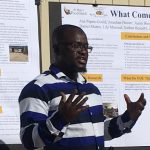Join our Graduate Program
Possible careers
- * Municipal and regional governance
- * Environmental, sustainability, and social justice education
- * Non-profit program coordination
- * Sustainable food systems
- * Natural and sustainable building
- * Community organizing
- * Justice and equity leadership
Sustainable Communities, Master of Arts
This is an interdisciplinary program that enables students to create their own course of study to address their intellectual, ethical and practical concerns.
Among the earliest of its kind to be developed, this degree can enable students to merge the field of liberal studies with critical issues related to sustainability and community life.
Since sustainability implies interconnectedness and a systems understanding of knowledge, sustainable communities (SUS) students study the intersections between human social structures and the natural world, paying attention to the philosophical, ethical, and practical dimensions of such study. This program is issue-based: Rather than learn a discipline, SUS students focus on a particular issue or nexus of issues.
Requirements Accordion Open
To receive a master’s degree at Northern Arizona University, you must complete a planned group of courses from one or more subject areas, consisting of at least 30 units of graduate-level courses. Many master’s degree programs require more than 30 units.
You must additionally complete:- All requirements for your specific academic plan(s). This may include a thesis.
- All graduate work with a cumulative grade point average of at least 3.0.
- All work toward the master's degree must be completed within six consecutive years. The six years begins with the semester and year of admission to the program.
Read the full policy here.
Overview Accordion Closed
In addition to University Requirements:
- Complete individual plan requirements.
| Minimum Units for Completion | 36 |
| Additional Admission Requirements | Individual program admission requirements over and above admission to NAU are required. |
| Fieldwork Experience/Internship | Required |
| Thesis | Thesis is required. |
| Oral Defense | Oral Defense is required. |
| Research | Individualized research may be required by chosen emphasis or offered as an option. |
| Progression Plan Link | View Program of Study |
| Accelerated Undergraduate/Graduate Plan | Optional |
Purpose Statement
The mission of the Master of Arts in Sustainable Communities is to provide interdisciplinary face-to-face graduate education on the complex issues of sustainability and social justice, encouraging students to pursue important social and environmental issues concurrently. The program seeks to educate students as critical thinkers for community leadership and to enable its graduates to contribute to the well-being of communities. At the same time, the program aims to push students intellectually, looking to produce thoughtful and critical graduates who can think theoretically. The curriculum is student-centered; students bring their intellectual, ethical, and practical concerns to bear on their particular academic inquiry. These skills are sharpened in collective collaborations between students and different communities through praxis.
Central Concepts Of The Program
- Sustainable Communities: sustainability encompasses the interactions between human and natural systems; sustainability is broadly defined and emphasizes the necessity for people to live in communities. Students explore what makes communities economically, environmentally, socially resilient and equitable, and how to ensure that communities have a direct say in building their future. They also examine the interactions and networks that form between different communities at the local, bioregional, national, and international levels.
- Civic Engagement: students envision themselves as interconnected to the fabric and leadership of the university through both their work on the university campus as well as their meaningful participation in the larger Flagstaff community through the use of various models of activism, organizing, and scholarship. This includes examination and use of various models of activism and organizing, historical analysis of movements for social change, and other scholarship on democratic practice and civic engagement.
- Inquiry-based Research: recognizes the interdependence between theory, modes of inquiry, and practice. Students explore models and understandings of action research and community-based research.
- Scholar-Activism: scholarship and praxis acknowledges and speaks directly to the needs of communities and offers theoretically and empirically pragmatic solutions grounded in sustainability. Approaches are inherently interdisciplinary and take into account the social, cultural, economic, and ecological dimensions of issues.
- Social Justice: considers issues of environmental and community sustainability as deeply interrelated. Students examine relationship between intersectionality of multiple identities (e.g. race, ethnicity, social class, gender identity, language) with issues of power, access to resources, place, climate change, and ecological impact.
- Social Transformation: recognizing that individual transformation in terms of knowledge, understanding, and skills are deeply connected to collective transformation, students critically reflect and demonstrate elements of individual transformation as well as the implications of their work towards collective transformation.
Student Learning Outcomes
- Define, examine and apply various interdisciplinary definitions and conceptions of sustainable communities.
- Distinguish, formulate and evaluate interdisciplinary theories and modes of social transformation through multiple communities.
- Identify, question, and transform power dynamics between environmental, economic, ecological, and social factors that foster or inhibit sustainable communities.
- Name, describe, interpret positioning self along lines of differences and lived experiences vis-à-vis sustainable communities.
- Appreciate, generate, and apply interdisciplinary methods of inquiry.
- Recognize, explain and synthesize how global, local, economic, political, and cultural systems are interrelated.
- Think critically through reading, writing and discussions.
- Work collaboratively along lines of difference (e.g. race, class, gender, etc.) in classrooms and communities.
- Foster and develop strong interpersonal, listening, and leadership skills.
- Develop and apply different ethical and social justice frameworks.
- Translate understanding to action and commitment using multiple change-agent strategies.
- Imagine and design possible alternatives of sustainable communities.
- Facilitate and create inclusive, diverse, egalitarian, and democratic spaces in the classrooms and communities.
Details Accordion Closed
Graduate Admission Information
The NAU graduate online application is required for all programs. Admission to many graduate programs is on a competitive basis, and programs may have higher standards than those established by the Office of Graduate and Professional Studies.
Admission requirements include the following:- Transcripts.
- Undergraduate degree from a regionally accredited institution with a 3.0 GPA on a 4.0 scale ("A" = 4.0), or the equivalent.
Visit the NAU Graduate Admissions website for additional information about graduate school application deadlines, eligibility for study, and admissions policies.
Ready to apply? Begin your application now.International applicants have additional admission requirements. Please see the International Graduate Admissions Policy.
Additional Admission Requirements
Individual program admission requirements over and above admission to NAU are required.
- Three letters of recommendation
- Personal statement or essay
Master's Requirements
This Master's degree requires 36 units distributed as follows:
- Sustainable Communities Common Coursework: 17 units
- Sustainable Communities Focused Electives: 13 units
- Thesis: 6 units
Take the following 36 units:
- Students completing a thesis are required to complete 18 units of formal letter-graded coursework.
- Sustainable Communities Common Coursework (17 units)
- Sustainable Communities Focused Electives (13 units)
- Electives related to sustainable communities and focused on your area of study, chosen in consultation with your graduate advisor. Courses may include independent study and fieldwork experience, as well as special topics courses and courses from disciplines across the University. (13 units)
- Thesis (6 units)
- SUS 699, for the research, writing, and oral defense of an approved thesis. (6 units)
In preparing your thesis , you may end up taking more than the 6 units of thesis credit because you must enroll each term while you are working on your thesis.
Accelerated Bachelor's to Master's Program
This program is available as an Accelerated Undergraduate/Graduate Plan wherein a student may start a master's degree while simultaneously completing their bachelor's degree.
Students enrolled at the Flagstaff campus for both undergraduate and graduate programs are eligible to complete the Bachelor of Arts in Environmental and Sustainability Studies and start a Master of Arts in Sustainable Communities at NAU.
OR
Students enrolled at the Flagstaff campus for both undergraduate and graduate programs are eligible to complete the Bachelor of Science in Environmental and Sustainability Studies and start a Master of Arts in Sustainable Communities at NAU.
OR
Students enrolled at the Flagstaff campus for both undergraduate and graduate programs are eligible to complete the Bachelor of Science in Sociology and start a Master of Arts in Sustainable Communities at NAU.
- Students must apply to the master's program by the graduate program's application deadline, meet all admissions requirements listed in the policy Accelerated Bachelor's to Master's Programs, as well as the admissions requirements for the specified master's plan to be considered for admission. Admission to programs is competitive and qualified applicants may be denied because of limits on the number of students admitted each year.
Be sure to speak with the Master's Program Director/Coordinator regarding your interest in the accelerated plan.
- Students must apply to the master's program by the graduate program's application deadline, meet all admissions requirements listed in the policy Accelerated Bachelor's to Master's Programs, as well as the admissions requirements for the specified master's plan to be considered for admission. Admission to programs is competitive and qualified applicants may be denied because of limits on the number of students admitted each year.
Students accepted into one of the Accelerated Programs should complete the same requirements for the graduate degree as defined above.
Additional Information
Some courses may have prerequisites. For prerequisite information, click on the course or see your advisor.
About Our Master's
A Community Approach to Transformative Sustainability
The Sustainable Communities program prepares students to enact positive social change. We take an interdisciplinary and intersectional approach to sustainability, enabling and encouraging our students to develop their own vision for a just world. Our graduate curriculum provides a theoretical foundation to understand societal problems and to identify opportunities for moving through them. Students engage dominant and alternative economic, political, social, and philosophical paradigms as they develop their understanding of how to work for a more just and sustainable world. Students work closely with community organizations and initiatives, developing organizing and leadership capacity that build on skills they workshop and study in the classroom. Combining robust theoretical grounding with applied community engagement sets our program apart and positions our students as capable participants and leaders of social change.What's sustainability? Accordion Closed
What can I do with this degree? Accordion Closed
- municipal and regional governance
- environmental, sustainability, and social justice education
- non-profit program coordination
- sustainable food systems
- natural and sustainable building
- community organizing
- justice and equity leadership
What will I learn? Accordion Closed
Can I get funding? Accordion Closed
- are admitted to the Sustainable Communities program
- are enrolled as full-time graduate students (taking a minimum of 9 hours per semester)
- maintain a 3.0 GPA (with no grades below B and no grades of “incomplete”)
Why NAU? Accordion Closed
More about our program
The M.A. program in Sustainable Communities (SUS) at NAU integrates many areas of study, including anthropology, the arts, business, humanities, economics, education, environmental science, history, political science, psychology, religion, sociology, women's studies, and technology. Students gain both depth and breadth in understanding issues important to sustaining community life by choosing from among our own courses and those from across the university. This is a 36-credit-hour program that culminates in a thesis or final project and encourages you to pursue social and environmental sustainability issues. Our guiding principles are:- Inter-disciplinary inquiry
- Linking theory and practice
- Issue-based research
- Learner-based curriculum
- Working with community
- Flexible pedagogy
Recent theses and final projects
Students in the Sustainable Communities program at NAU choose coursework that provides them with the unique perspectives and skills they need to complete a thesis or final project. They work closely with a committee, often made up of faculty from across the university. Here's a sampling of their work.- Rachel Ellis: Exploring Anticolonial Protective Pathways for the Confluence of the Colorado and Little Colorado Rivers. Find the resulting journal article in the Journal of Contemporary Water Research and Education here.
- Andee Lister: Bioaccumulation of Uranium in Sheep Heart and Kidney, and Impact on Traditional Food Sources
- Rikayla Scholl: First-Generation Students and Climate Change: An Underresearched and Vital Relationship
- Mackenzie Messing: Fat Outside: An Arts-Based and Narrative Inquiry Approach to Building Fat-Positive Community and Connection in Nature
- Meredith Harbman: Greening Spiritual Disciplines: Engaging in Environmentally Responsible Behavior as a Christian Spiritual Practice
- Kelsey Morales: Community Renewable Energy: A Case Study of Democratic Relationships and Just Practices
- Tyler Linner: Praxis Plastics: A Recycle-ception on Local Plastics Reuse. Read the blog here.
- Danya Gorel: Mapping the Structure, Organization, and Potential Development for Terra BIRDS, a Local Nonprofit
- Jake Mann: Understanding the Role of Passive Architectural Design as a Strategy for Energy Reduction and Anthropogenic Climate Change Mitigation
- Darren Bingham: Decomposing the Semantics of Local Food: An Analysis of USDA Food Flows and Organizations of Arizona. Read the resulting journal article in Applied Geography.
- Coreen Walsh: The Cardenas Restoration Project: A Film. Watch it here.
Student spotlight
Sufyan Suleman

Samantha Hipolito

Michel Silva
I’m passionate about the implementation of technologies towards achieving sustainable communities. I believe that we are at a point in history where economical constraints are no longer an excuse for the implementation of sustainable systems. With the continuous development and cheapening of these technologies, it is now a matter of priorities to implement them towards replacing our fossil fuel connected economy.





